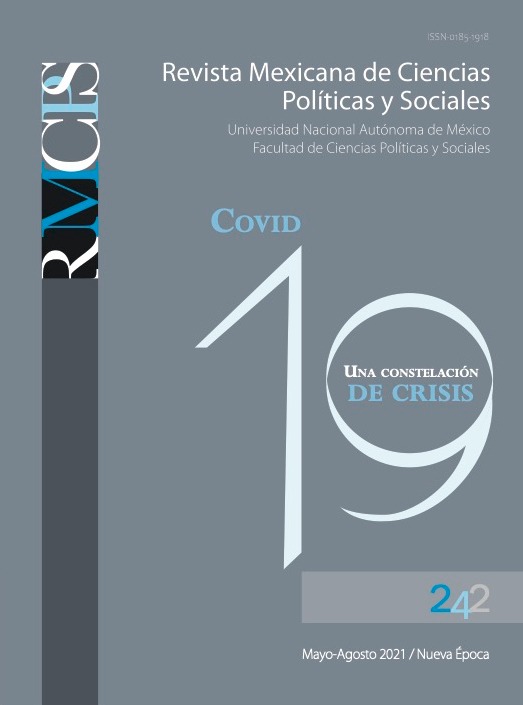Is global thinking still valid?
Main Article Content
Abstract
Downloads
Article Details
References
Appadurai, Arjun (2015) Après le colonialisme. Les conséquences culturelles de la globalisation. Paris: Payot.
Beck, Ulrich (2006) The Cosmopolitan Vision. Cambridge: Polity Press.
Beck, Ulrich (2016) Metamorphosis. Londres: Polity Press.
Bello, Walden (2002) Deglobalization, Ideas for a New World Economy. Londres/New York: Zed Books.
Camic, Charles (2007) “On edge: Sociology during the Great Depression and the New Deal” en Calhoun, Craig (ed.) Sociology in America: A History. Chicago: Chicago University Press.
De Tocqueville, Alexis (1985) [1856] L’Ancien régime et la Révolution. Paris: Gallimard.
Chakrabarty, Dipesh (2007) Provincializing Europe – Postcolonial Thought and Historical Difference. Princeton: Princeton University Press.
Dossier dedicado a Immanuel Wallerstein (2021) Socio (15).
Fukuyama, Francis (1992) The End of History and the Last Man. New York: The Free Press. Minc, Alain (1999) La mondialisation heureuse. Paris: Pocket.
Morin, Edgar (2015) Penser global. L’humain et son univers. Paris: Robert Laffont.
Solomos, John (2020) Routledge International Handbook of Contemporary Racism. Londres: Routledge.
Subrahmanyam, Sanjay (2014) Aux origines de l’histoire globale. Paris: Fayard.
Wieviorka, Michel y Jacques Moret (2017) Les sciences humaines et sociales françaises à l’échelle de l’Europe et du monde, Rapport à Monsieur Thierry Mandon, secrétaire d’Etat à l’Enseignement supérieur et à la recherche. Paris: Maison des Sciences de l’Homme.
Wieviorka, Michel; Levi-Strauss, Laurent y Gwenaëlle Lieppe (2015) Penser global. Interna- tionalisation et globalisation des sciences humaines et sociales. Paris: Maison des Sciences de l’Homme.
Wirth, Louis (1928) The Ghetto. Chicago: The University of Chicago.

La Revista Mexicana de Ciencias Políticas y Sociales publicada por la Universidad Nacional Autónoma de México se distribuye bajo una Licencia Creative Commons Atribución-NoComercial-SinDerivar 4.0 Internacional.
Basada en una obra en http://www.revistas.unam.mx/index.php/rmcpys/
La RMCPyS autoriza a sus colaboradores que suban una copia de sus trabajos publicados en sus webs personales o en cualquier repositorio de acceso abierto, siempre y cuando se mencione específicamente a la Revista Mexicana de Ciencias Políticas y Sociales como fuente original de procedencia, citando el año y número del ejemplar respectivo y añadiendo el enlace a la página web donde este órgano editorial puede ser consultado in toto, de manera abierta y gratuita en: <www.revistas.unam.mx/index.php/rmcpys>.
Las y los lectores tienen libertad para:
Compartir, copiar y redistribuir el material en cualquier medio o formato.
El licenciante no puede revocar estas libertades en tanto usted siga los términos de la licencia.
De acuerdo con los siguientes términos:
- Atribución: la/el lector/a debe reconocer el crédito de una obra de manera adecuada, proporcionar un enlace a la licencia, e indicar si se han realizado cambios. Puede hacerlo en cualquier forma razonable, pero no de forma tal que sugiera que tiene el apoyo del licenciante o lo recibe por el uso que hace.
- No comercial: la/el lector/a no puede hacer uso del material con fines comerciales.
- Si se mezcla, transforma o se desarrolla a partir de la obra licenciada, no se permite la distribución del material modificado.
Cargos por gestión de artículos
La Revista Mexicana de Ciencias Políticas y Sociales NO cobra tarifas por recibir, procesar o publicar los artículos (Article Processing Charge [APC]) enviados por los autores.

